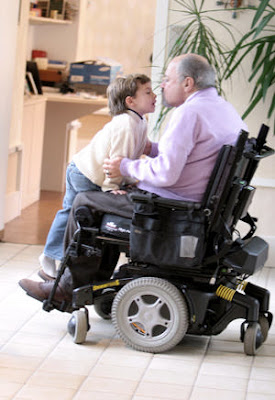A Grandfather's Lessons on Love, Loss, and the Gifts of Life
Read his letter below
When his grandson was born, Daniel Gottlieb began to write a series of heartfelt letters that he hoped Sam would read later in life. He planned to cover all the important topics -- dealing with your parents, handling bullies, falling in love, coping with death -- and what motivated him was the fear that he might not live long enough to see Sam reach adulthood. You see, Daniel Gottlieb is a quadriplegic -- the result of a near-fatal automobile accident that occurred two decades ago -- and he knows enough not to take anything for granted.
Then, when Sam was only fourteen months old, he was diagnosed with Pervasive Developmental Disability, a form of autism, and suddenly everything changed. Now the grandfather and grandson were bound by something more: a disability -- and Daniel Gottlieb's special understanding of what that means became invaluable.
A lovingly written, emotionally gripping book that offers unique -- and universal -- insights into what it means to be human.
In addition to his thriving psychotherapy practice, Daniel Gottlieb serves as the host of Voices in the Family, an award-winning mental health call-in show on Philadelphia's much-respected public radio station, WHYY. He also writes a bimonthly column for the Philadelphia Inquirer entitled "On Healing," and is the author of two books. He lectures locally and nationally on a variety of topics affecting the well-being of people, families, and the larger community.
http://www.drdangottlieb.com/
"A collection of heart-felt letters that touches the heart in the softest way. Perfectly expressive love letters from a grand father to his grand son. Highly recommended" - A2G
POP DAN & LITTLE SAM
Sex, Lies, and What It Means To Be A Man
Dear Sam,
My early experiences with girls took place when I was in my teens. And, like most boys of that age, I pretended to know more than I really did, to be more competent and experienced than I was. I couldn't turn to anyone for guidance. Not only that, but I didn't feel I had the option to stop and think about whether I was ready for this activity because there was so much pressure to "be a man". And I lied. I lied to the girls I was with about my experience, I lied to my male friends about the same thing, and I lied to myself about whether I was ready.
I'm not sure why, but I think it's in the nature of men that we have to pretend we know things. If there's something we don't know, we try to fake it. But that doesn't work well at all, especially when you find someone you love. When you want to find out what feels good and what pleases your partner, it's a lot more helpful to admit ignorance than to pretend to know.
When I was learning about family therapy, I had a great teacher, Carl Whitaker, who felt strongly about the inportance of confusion. To him, knowing was a lot less important than searching. "Confusion is like fertilizer," he said. "It feels like crap when it happens, but nothing grows without it."
Some years later, this advice came back to me when I was a guest expert on a show concerning substance abuse. On the show I was being interviewed by three kids who all asked good, probing questions. One of the questions stumped me, and I said so.
"I don't know," I told the young man. "I'll look it up. Give me a call on Monday."
Afterward, one of the program engineers approached me to say he'd been blown away by the response. "I've never-ever-heard someone say 'I don't know' on this show," he told me.
It was the first time in my life I'd been praised for saying those three words. And it changed something in me. Ever since, I have not hesitated to use them.
Sam, be ignorant. It can be the beginning of something wonderful. When you say to your partner, "I don't know" - or your partner says those words to you - then you can begin to learn about what feels good physically and emotionally. You can learn about sex, love, life and fear. You can learn about yourself.
When you are with someone for whom you have great affection and respect, ask how you can give and receive the greatest enjoyment. What you discover together is far more than you can learn by yourself. As you learn, you will find yourself attending your partner rather than pretending with her. And when you address her needs with care, love, and patience, you will find your feelings of devotion enhanced multifold. You will know the great happiness of altruistic love.
This kind of love is so pure that you can take great pleasure in your partner's joy and feel great sadness in her suffering. Your most fervent wish is for her happiness. When you love your partner in this boundless way, you can make love when you look into hear eyes, share a meal together, or ask her about her day. You can experience this adoration when you aren't together. You can carry it with you always.
Love,
Pop



No comments:
Post a Comment